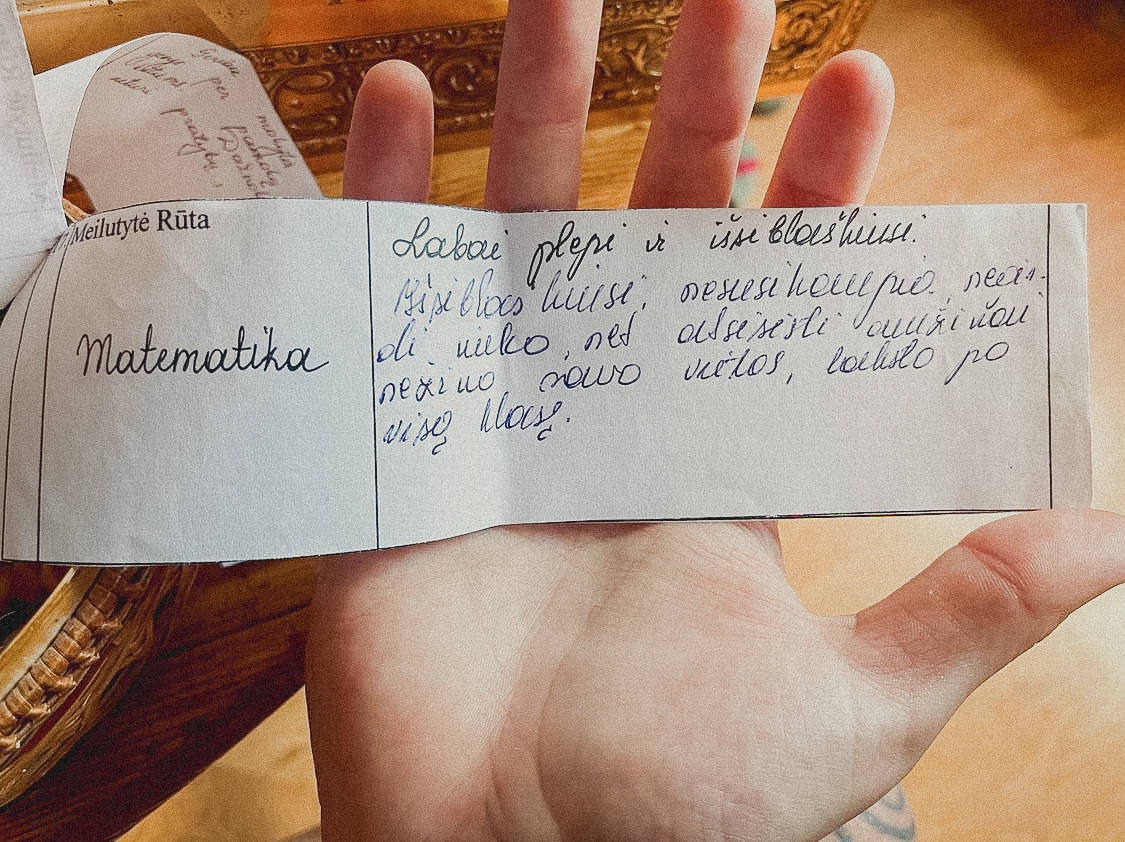
RŪTA MEILUTYTĖ, SWIMMER


RŪTA MEILUTYTĖ, SWIMMER
Lithuanian teacher: “Problematic behavior in class inhibits better learning. The girl is easily distracted, chatterbox, and doesn’t let others to focus on their schoolwork. Often comes to school unprepared, doesn’t have a textbook or a pen.”
English teacher: “Gifted but lazy. When she makes an effort to study, everything goes well, otherwise she chatters a lot, fusses around during lessons. When she calms down, everything goes well.”
Math teacher: “VERY CHATTY AND EASILY DISTRACTED. Doesn’t concentrate, doesn’t hear anything, doesn’t even know her place in class, keeps running around the room.”
Biology teacher: “She could be an ideal student, but she has her fits of folly.”
History teacher: “Easily distracted, often forgets to do her homework, but smart and quickly understands the situation. Her biggest flaw is her talkativeness, but she works actively in class, always has an answer, and is a thoughtful student.”
This is what my fifth grade teachers wrote about me in my gradebook. I felt I was a failure, incapable, like I was lacking something.
I now understand that my distractions were rooted in my inner insecurity and anxiety. When I was only four years old, my mom passed away, and my dad lived in the United States until I was eight. During this time, we had no live communication, only phone calls. My grandmother raised my brothers and me, and though she provided for us and gave us lots of love and affection, she could not replace our parents. I think deep down, I missed the security and love that comes from having a stable family, which manifested as some kind of rebellious behavior.
When my dad returned to Lithuania, he struggled to find work due to the country’s economic crisis. He had to go and work abroad, so he was never around. Eventually, when I was 13 years old, he took me to England to live with him, swim, and continue my studies. I was violently resistant to the idea because I didn’t want to leave my home and friends.
On the contrary, when it came to sports, I lacked nothing. It was the one aspect of my life where I excelled and was consistently encouraged. I have always possessed a natural agility and resilience, and I began to take swimming more seriously at the age of 11. I had my goals and dreams. Sports became a refuge from the tensions of school, allowing me to unwind and get away from things that didn’t satisfy or interest me.
For as long as I can remember, I always lacked self-confidence, particularly when facing difficulties at school. I immediately thought I am not talented enough to succeed. However, I coped well with challenges in sports, I was strong both physically and psychologically. I would just go into stoic mode and push on.
As a child, I mostly spent time with boys, playing basketball and soccer. It was difficult for them to understand without insulting me why a girl runs faster than them, why she can do the most pull-ups and climb all trees. Being different from other girls made me a target for ridicule starting from the age of ten, and I was often subjected to insults such as “flat as a board,” “no tits,” and “lad.”
As a child, Rūta once fell from a tree and was often sick. She wanted to become a skateboarder. She won the Olympic gold when she was fifteen. She has been swimming for 14 years now.
Interview and photos by Sergej Grigorjev
Translation by Emilija Ferdmanaitė